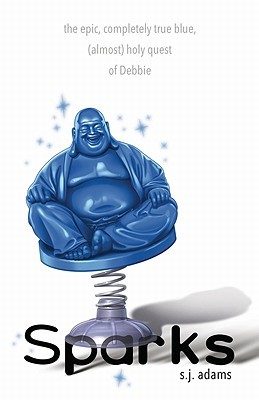When Debbie’s best friend Lisa contemplates getting her V-card punched, Debbie decides to put all her cards on the table and confess her love…and lesbianism…to Lisa.
Sixteen-year-old Debbie is religiously devoted to her best friend Lisa, a happy heterosexual who’s devoted to her religion, not to mention the dullest dude in Des Moines. When Debbie thinks Lisa is going to get her V-card punched, the novel’s protagonist, impetuous and full of spontan-gay-ity, decides to put all her cards on the table.
Alas, Debbie isn’t playing with a full deck, and neither are her brand new besties, Emma and Tim. This pair of cards has established not only a friendship, but a religion as well. They’re Bluedists, members of The Church of Blue–basically Buddhism for the awkward and agnostic. Out of the queer blue sky, these bright sparks embark on a lark to help Debbie realize her dream of getting her dream girl. Will this trio ace their (almost) holy quest?
Well… let’s just say that three of a kind do not constitute a full house, and Full House, a wholly heterosexist guilty pleasure of a sitcom, is pretty much Debbie’s only source of advice about pretty much everything. The sappy superficiality of that show serves as the writer’s inspiration. We get similarly uncomplicated characters who are winsome but not witty, cute but not astute.
I actually adore Full House, but I wish the writer had sought inspiration from a more… inspiring ‘80s sitcom, such as Designing Women. If he–yes, he–had done so, he would have gotten some great advice from one of the leading ladies’ ex-husbands, himself a writer: “The idea is not just to state but to illuminate.”
Unfortunately, this book is in a state-your-mind state of mind and consists (almost) exclusively of dialogue.
Characters talk the talk and walk the walk, but there’s no insight, no introspection, no imaginative imagery. If this story were made into a movie, the movie would be better than the book. At least in the film version, the actors could give the characters some characterization, and perhaps a little motivation for their actions. The implausible plot might be forgivable, even enjoyable, on film.
On paper, it’s a frustrating read, because it could, should, and would have been sparky, and possibly epic, if the author had spent more time on the tale and less time on the title.
To misquote Michelle Tanner, “You don’t got it, dude.”
